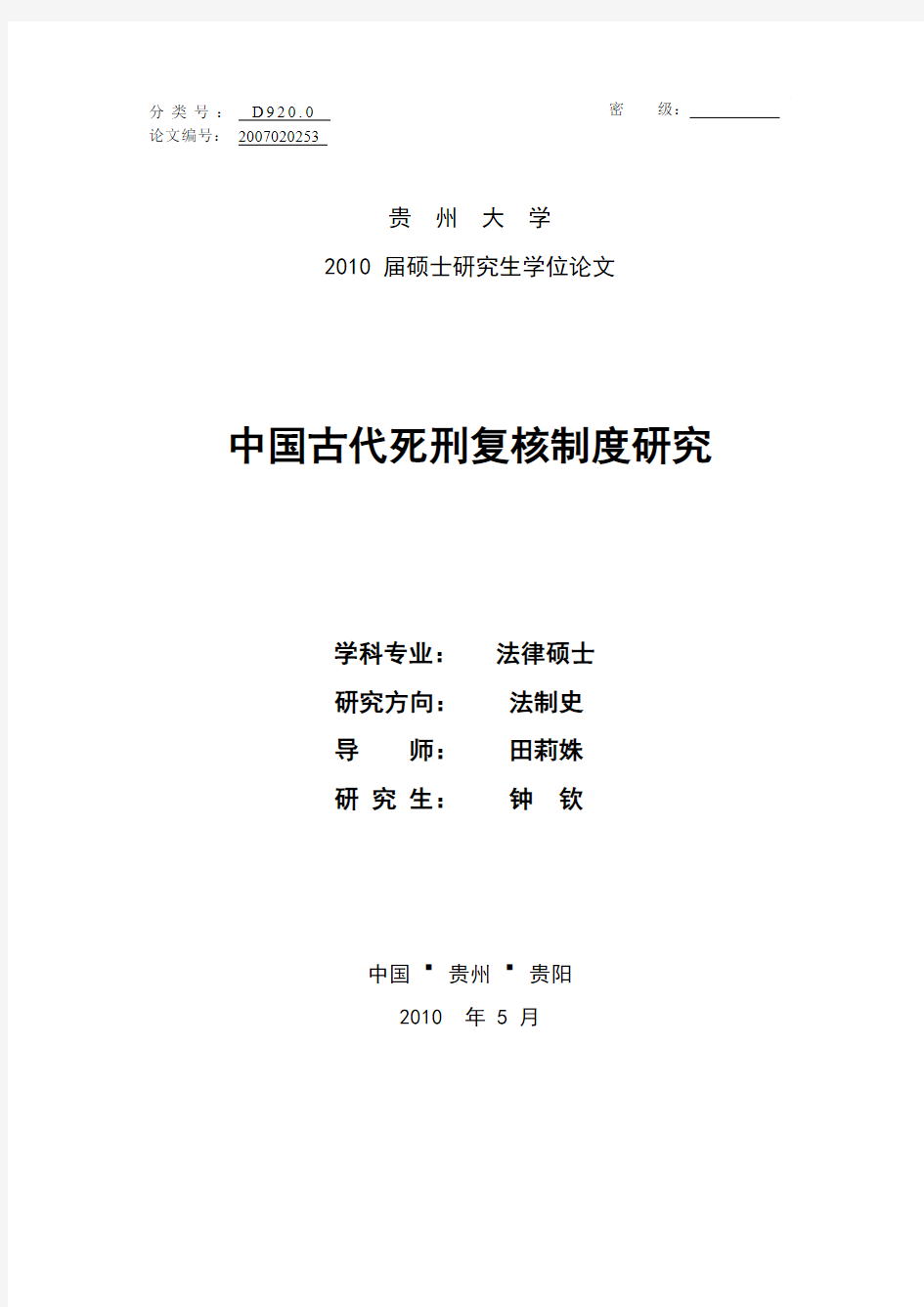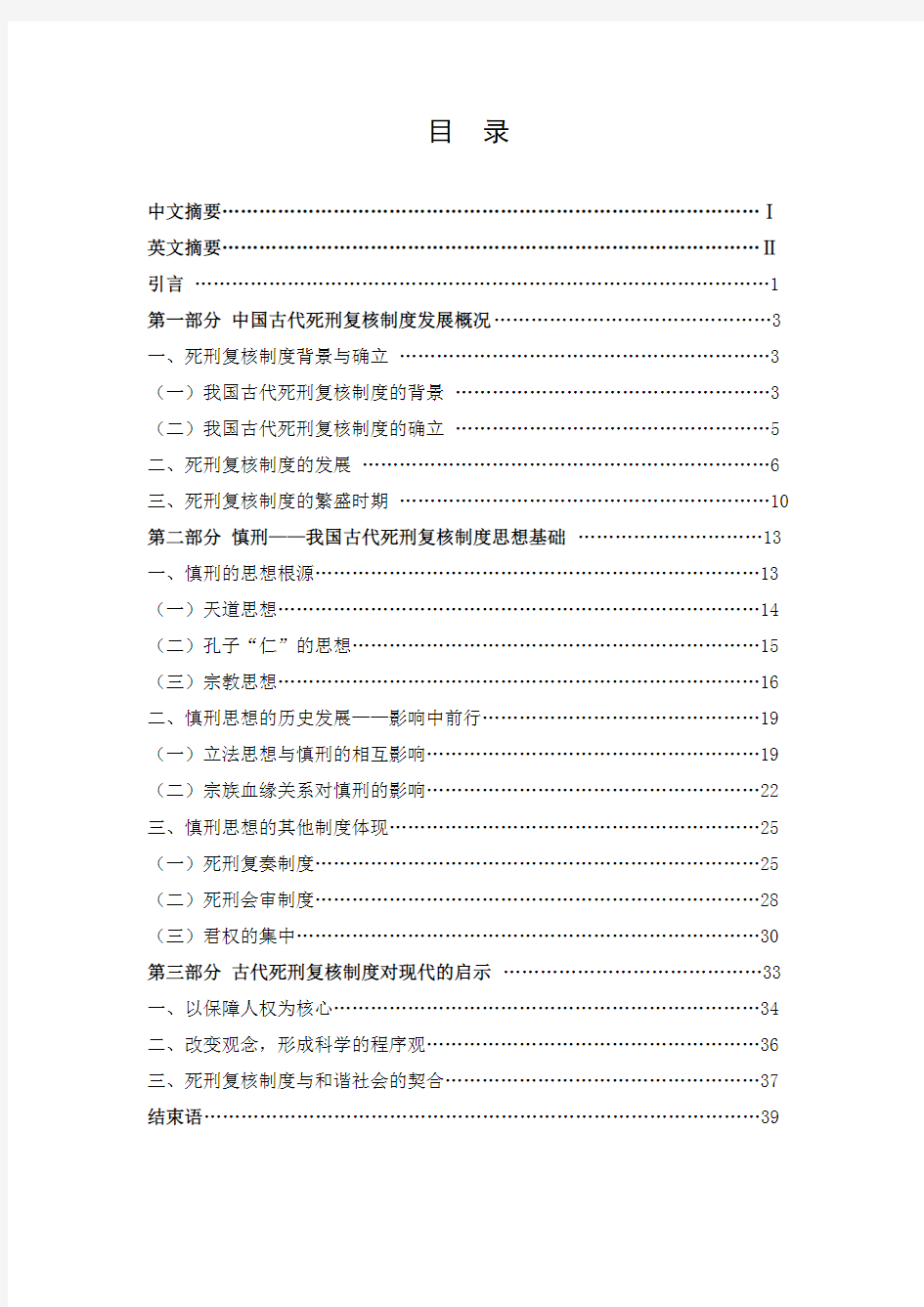中国古代死刑复核制度研究


贵州大学
2010届硕士研究生学位论文
中国古代死刑复核制度研究
学科专业:
研究方向:
导师:田莉姝
研究生:
中国﹒贵州﹒贵阳
2010年5月
目录
中文摘要 (Ⅰ)
英文摘要 (Ⅱ)
引言 (1)
第一部分中国古代死刑复核制度发展概况 (3)
一、死刑复核制度背景与确立 (3)
(一)我国古代死刑复核制度的背景 (3)
(二)我国古代死刑复核制度的确立 (5)
二、死刑复核制度的发展 (6)
三、死刑复核制度的繁盛时期 (10)
第二部分慎刑——我国古代死刑复核制度思想基础 (13)
一、慎刑的思想根源 (13)
(一)天道思想 (14)
(二)孔子“仁”的思想 (15)
(三)宗教思想 (16)
二、慎刑思想的历史发展——影响中前行 (19)
(一)立法思想与慎刑的相互影响 (19)
(二)宗族血缘关系对慎刑的影响 (22)
三、慎刑思想的其他制度体现 (25)
(一)死刑复奏制度 (25)
(二)死刑会审制度 (28)
(三)君权的集中 (30)
第三部分古代死刑复核制度对现代的启示 (33)
一、以保障人权为核心 (34)
二、改变观念,形成科学的程序观 (36)
三、死刑复核制度与和谐社会的契合 (37)
结束语 (39)
致谢 (40)
参考文献 (41)
我国古代死刑复核制度研究
随着人权问题的入宪,对于生命权的保护,死刑的控制问题的讨论也不得不提上日程,2004年人权入宪更是以基本法的方式确定了人权在中国的法律地位,在当今的国际社会,保障人权已经普遍成为各国的共识。当然,每个国家历史文化的不同导致了对人权问题的认识也不尽相同,侵犯人权的事件在各国也还时有发生,但不会有任何国家会公开声称反对保护人权。因为人权的保障是全人类长期以来孜孜追求的共同理想。
设立死刑复核程序的目的之一,正是为了更好的保障人权。以铜为镜,可以整衣冠;以史为鉴,可以知兴替。历史的巨大动力总能让我们受益于我们的生产、生活,而对于法治的发展,这样的推动力同样必不可少,我们研究死刑复核制度,也必须对我国古代死刑复核制度进行考察,做出科学的历史分析,才能真正改进和完善我国的当前的死刑复核制度,我国古代的死刑复核制度历史悠久,汉朝时就已产生了死刑复核的萌芽,三国两晋南北朝时得以确立,唐宋时得到了很大的发展,明清时更是到了繁盛时期,其所体现的慎刑思想更是我们传统思想的精髓。
慎刑的思想根源来自三个方面,一是天道思想,在古人的观念里,天并非人格化的上帝,但也不是与生命无关的科学对象,可以说,它是某种自然的生命力量,养育万物,造化天地。然而这种思想,在人们有了政治意识和政治活动之后,就把它当成了这些都是有上天赋予的,因此才有了“万物本乎天”这一说法,所谓的天,人们认为是有意识、有感觉、能辨善恶,这样的天,不是与人隔绝的,而是与人相通的,能直接监督人类一切的政治活动。在这种观点下认为在人事上,特别在刑罚上,若死刑适用过多,会导致天事的不畅,进而出现各种自然灾害和社会动荡。二是孔子“仁”的思想,仁的思想不但在形成中国文化特有的传统结构中发挥了主干作用,而且也给我们民族的心理打上了深深的印痕。这一切,不论其积极面还是其消极面,都同孔子有着解不开的关系。孔子论“仁”,其一,仁为“众德之总”。孔子认为一切美好的品德统统包摄在他的仁学之中。其二,仁者“爱人”。孔子提倡“泛爱”、“博施”,就已表现他的“爱人”主张具有普遍
的人类之爱的意义。当然,这不等于说这种主张没有阶级性。其三,“忠恕”。忠恕指大家以己度人,推己及人,实行有差等的爱,这便是能近取譬的忠恕为仁之方。“忠恕”之道在貌似一视同仁中隐藏着阶级偏私,但“忠恕”毕竟是建立在多少要求人格自重和尊重对方人格的基础之上的。三是宗教思想。道教和佛教是中国古代最有影响力的两大宗教,至今仍然很有影响力。老子李耳是道家的创始人。“无为而治”是老子自然法的最高原则。“无为”首先要求不扰民。“无为”还是一种为君治国之术。佛家思想是宣扬唯心主义,通过对心理现象的分析,论证物质是依赖人的主观认识,宣扬世界和人生都是虚幻的,追求精神上的领悟,当然也强调慈悲作善事。
慎刑思想是传统中国文化在法律层面的体现,它的发展与形成伴随着死刑复核制度的发展和完善,由诸如礼刑并用、明德慎罚等一系列诉讼文化发展而来,经过长期的发展演变,形成了内容较为丰富的理念体系,由此形成的思想、观点、政策构成了中华法制文化理念的精髓,直至新中国成立为止的四千多年时间里,历经奴隶社会、封建社会、半封建半殖民地社会。每一种社会状态下的每一个朝代,统治阶级都千方百计的采取立法措施,来维护政治统治,而这些立法思想中所显现的慎刑观对后世产生了深远的影响。慎刑思想还在宗族血缘关系的影响下发展前进,瞿同祖曾指出:“家族主义及阶级概念始终是中国古代法律的基本精神和主要特征,他们代表法律和道德、伦理所共同维护的社会制度和价值观念。”而儒家鼓吹的贵贱、尊卑、长幼、亲疏有别,要求人们的生活方式和行为符合他们在家族内的身份和社会、政治地位,不同的身份有不同的行为规范,正是因为如此,宗族血缘关系才对慎刑思想产生了深远的影响,出现了许多基于宗族关系的法律制度,而正是这些制度,对我国古代的死刑复核制度发展有着不可估量的推动作用,且暂不论这些作用是正向或反向。
在1600多年死刑复核制度的发展过程中,慎刑思想还体现了很多其他的制度,第一为死刑复奏制度,死刑复奏与死刑复核是在程序上前后相继的两种制度。有了死刑复核才会有死刑复奏,而死刑复奏则使死刑复核真正落到实处,发挥作用。之所以说死刑复奏制度是死刑复核制度中慎刑思想的体现,是因为死刑复核制度进行到最后,多半都要进行复奏,而在复奏这一环节上,慎刑思想往往被体现得淋漓尽致。第二为死刑会审制度,死刑会审是中国古代死刑制度的重要内容,
同时它也是慎刑思想在死刑审判上的直接体现。中国古代的审判机构是伴随着国家的产生而产生、国家的性质、形态的变化而变化的,而其中有关死刑的审判制度也是随着慎刑思想在各个时代在不断的发展而变化的。第三为君权的集中体现,在古代死刑制度中,确立皇帝在审判程序上的核准权和执行程序上的核准权,固然是古代封建专制、皇帝个人控制司法的表现,但同时也不能不说是封建统治者慎刑思想的体现。而统治者的慎刑观通常起着相当重要的作用。
借古鉴今,我国历史上各朝代的统治者对死刑问题采取审慎态度,并设计了较为严格的复核程序,确实达到了“慎用死刑”的效果,为我们今天限制死刑,完善我国现行死刑复核制度,提供了一个很好的参照。因此,我们应当树立科学的生命观、人权观。生命的惟一性、脆弱性都决定了人的生命是法律必须首要给予保护的,是现代法治社会最重要的任务。所以,生命权就获得核心人权的法律地位,因为没有生命权,其他权利都因为缺少生命这一物质的载体而缺少自身存在的意义。试想,我国的古人尚且能够慎重地对待生命,坚持慎刑慎杀的思想,并设计出行之有效的死刑复核制度,而我国当前的死刑复核程序的制度设计及司法实践却不能很好地保障犯罪嫌疑人、被告人的生命,这不能不说是很大的遗憾。作为具有五千年文明的负责任大国,中国在死刑问题的认识上决不能短视,在立足国情的基础之上,还要重视和国际主流意识相衔接,在我国最终废除死刑之前,应当将保障生命权和严格限制死刑的适用作为我国今后一个时期并且可能是长时期追求的基本价值目标。其次,我国在没有废除死刑的情况下,首要任务是保障死刑的程序公正。何谓公正,最重要的是作为审判程序一种的死刑复核程序应当符合审判权的中立性、公开性、程序性、终局性。公开审判是死刑复核程序的基本要求,是刑事诉讼的基本原则之一,也是联合国制定的刑事司法国际准则的重要内容,但在我们以往的死刑复核程序中,不开庭审判成了基本原则,而开庭审判成了例外,更不用说公开审判。封建时代的统治者即使是生杀予夺集于一人,可程序却一个都没有落下,尽管对于封建王朝,死刑复核这种审判程序有些时候真的只是一种形式,但形式也是“法律”,而法律就必须执行,在我们崇尚人权的今天,程序早就被赋予了更深刻的意义,作为司法人员更是应该形成一种程序意识,转变重实体、轻程序的思维方式和倾向,认识到实体和程序对诉讼都起重要的作用,二者缺一不可。最后,死刑复核制度在当今和谐社会的大背景下,是
现代法治对于人民权利的保证。权利,是一种社会价值。权利的主体是人,人是社会存在,以人为本而不是以物为本,就确立了权利的社会价值地位。和谐的社会生活中的权利关系,应当将权利的内容、行使的范围和方式、实现的最大限度等等加以确定,使权利本身成为人们社会行为的边界。和谐社会要坚持依法治国的基本方略,增强社会法治观念,促进社会公平正义的实现,不断推进建设社会主义法治国家的进程,要保证宪法规定的一切权利真正属于人民享有并切实有效行使,确立和实践“以人为本”的科学发展观。树立法律的权威,重视法律至上、以法治权,约束和限制公权力、防止公权力滥用,维护社会安定团结,保持长期和谐稳定的社会环境,做到坚持党的领导、人民当家作主和依法治国的有机统一。
关键词:死刑复核死刑慎刑安抚民心君权
country’’s The review system of death penalty in our country
ancient times
Summary
With the question of human rights in the constitution,the protection of life,the control of death sentence has to put on schedule,the human rights in the constitution is to identify the basic law of human rights in china's legal status,in the international community to ensure universal human rights has become a national consensus.of course,each country's historical and cultural differences caused to the question of human rights knowledge of human rights differ,Violations of human rights events in the countries are not infrequent,but no country will be declared against the protection of human rights.
One purpose of the review system of death sentence,it can better to protect human rights.History will always let us benefit from our production and living,For the rule of law,such as necessary impetus to our study of the death penalty must also observe and study our ancient the review system of death sentence,to analyze the history of science,can really improve and perfect our current system,Our country ancient time’s review system history to be glorious,when Han Dynasty has produced the seed,when three-country two jinn’s Southern and Northern Dynasties could establish,Tang and Song dynasty have a very big development,the bright peaceful and orderly times were to the prosperous time,its manifested the cautious punishment thought was our tradition thought essence.Cautious punishment thought root from three aspects:first,sun thought that in ancient's idea,day by no means personification God,but is not the scientific object which has nothing to do with the life,may say,it is some kind of natural life strength,raises the myriad things,the good fortune world. However,this kind of thinking,the people with political consciousness and political activities and took it for all these are endowed by heaven,with"everything depends on the god"this statement,the so-called days,people believed to be conscious and feel,could distinguish good and evil,this day,is not to cut off,but to meet the man, all political activity.At this point,think that the personnel,particularly in the death
penalty,if applicable,it will cause the days of impairment,a variety of natural and social unrest.Secondly,Confucius’s"ren",thought not only in the form of traditional Chinese culture plays a skeletal structure,but also for our peoples of the deep prints. All this,whatever its side was its negative aspects,with the master has not untie the relationship.Confucius think“ren”,firstly,be"the virtue of everything”.Confucius thought it a character handled a package in his theory.Secondly,the“love”. Confucius advocated"generic"and"love",he has done has been his"love"with the common man the meaning of love.Of course,this does not mean that this proposal. No class character.Third,“Loyal”.Refers to everybody to judge others by oneself loyally,puts oneself in another's place,implements has the difference and so on love, this is can nearly take for example loyally side of for the kernel.“Loyal”road,in apparent treats impartially hides the social class to be selfish,but“loyal”is the establishment after all,in how many request personality is self-possessed and respects opposite party personality above the foundation.Third,religious ideas.Taoism and Buddhism were China ancient times the most influential two big religions,until now still very much had the influence.Li Er is Taoism's founder.“Governs by non-interference”is the father natural law highest principle.“The inactivity”the first request does not harass the people.“The inactivity”is one kind is Mr.the kingcraft. The Buddhist thought publicizes the idealism,through to the psychological phenomenon's analysis,the proof material relies on person's subjective understanding, publicizes the world and the life is unreal,pursues in the spiritual the comprehension, certainly also stressed that the mercy makes the good.
The cautious punishment thought is the traditional China culture in legal stratification plane manifestation,its development and forms follows the death penalty to reexamine system's development and the consummation,by such as the ritual punishment use together,cautious punishes and so on a series of lawsuit culture development to come cautiously,to undergo the long-term development evolution, has formed the content richer idea system,from this forms the thought that the viewpoint,the policy constituted the Chinese legal system culture idea essence.Until the founding of the four thousand years,after slave society,feudal society,semi feudal
and semi colonial society.Every kind of social condition of every dynasty,the ruling classes are trying to take legislative measures to maintain the political rule and the legislation in thought the matter appeared at the stake for the descendant produced far-reaching effects.Cautious punishment still in their blood relation of development, Qu Tongzu once pointed out:“the clannish and the social class concept were throughout China ancient times the law basic energetic and the chief feature,they represented the social system which and the value idea the law and the morals,ethics institute maintained together.”But the Confucianism promotes,the high and low,the old and young,the friend or stranger to be able to discriminate in any case,requests people's life style and the behavior conforms to them in family's status and the society, the political status,the different status has the different behavior standards,because of this,the patriarchal clan blood relationship only then has had the profound influence to the cautious punishment thought that presented many legal regime which relates based on the patriarchal clan,but is precisely these systems,the review system of death sentence development to our country ancient time’s death penalty to have the inestimable promotion effect,and no matter these functions were temporarily forward or reverse.
In more than1600years the review system of death sentence developing process,the cautious punishment thought has also manifested many other systems, First,is procedure for memorial of death sentence,the memorial of death sentence and the review system of death sentence is after the procedure goes forward two systems one after another.Only have the review system of death will then have the memorial of death sentence,but the memorial of death sentence caused the review system of death lands on feet truly,display function.The reason that said that the procedure for memorial of death sentence is the review system of death sentence’s cautious punishment thought manifestation is because the review system of death to carry on finally must carry on the transcription reproduction mostly,but on transcription reproduction this link,the cautious punishment thought is often manifested incisively.Second,the death of the court system,an important part of the death penalty system in ancient China,it is allowed to the death sentence on the direct
embodiment of the trial.The Chinese ancient time’s trial organization followed the national production to have,the national nature,the shapes change to change,but the related death penalty's judicial system was also changes along with the cautious punishment thought in each time in the unceasing development.Third,is the monarchial power centralism manifests,in Chinese’s ancient times death penalty system,established in emperor's in trial program authority of examination and approval and the executive routine authority of examination and approval,no doubt was the ancient times feudal dictatorship,emperor individual control judicature's performance,but simultaneously also had no alternative but saying that was feudal ruler cautious punishment thought manifestation.But the ruler's cautious punishment view is usually playing the quite vital role.
Taking advantage of ancient warning now,in our country history various dynasty's ruler has the cautious attitude to the death penalty question,and has designed the stricter review procedure,has achieved truly“cautiously with the death penalty”the effect,limits the death penalty today for us,consummates our country present death penalty to the review system of death,has provided a very good reference.Therefore,we must set up a scientific life view and human rights view.Life just one time,and is vulnerability had decided person's life is the must most important the law must give the protection,is also the most vital duty in modern government by law society.Therefore,the life right is the core human rights in the legal status, because does not have the life,other rights will lack their own existence the significance.Suppose,in addition our country's ancients can treat the life prudently, insisted the cautious punishment kills cautiously the thought that and designs the effective death penalty to the review system of death,but our country current death penalty review procedure's system design and the judicial practice actually cannot safeguard the suspect,accused person's life well,this has no alternative but saying that is the very big regret.As has five millennium civilization responsible great nation, China can’t be shortsighted in the death penalty question,in above foothold national condition foundation,we must take seriously with the international mainstream consciousness to link up,before our country abolishes the death penalty finally,we
must safeguard the life power and the strict limit death penalty takes suitably our country possibly and will be in the coming period the long time pursue core value goal.Secondly,china is not the abolition of capital punishment cases;the foremost task is to protect the death penalty of procedural fairness.What is fair is the most important judgment procedure as one of the death penalty should be consistent with judicial procedures review of neutrality,openness and procedural and final.The open trial is the essential requirements in death penalty review procedure,is one of criminal prosecution's basic principles,is also the criminal justice international standards important content which the United Nations formulates,but in our former death penalty review procedure,did not hold court to place on trial the basic principle,but held court to place on trial the exception,never mention the open trial.Even if feudal period's ruler has absolute power over anybody’s life,but procedure actually has not fallen,although regarding the feudal dynasty,some times,the review system of death sentence is only one form,but the form is also“the law”,and the law must carry out. In our celebration today,the application of human rights have been given a much deeper meaning,for judicial officers are supposed to constitute a procedure,the transformation of the entity,the way of thinking and tendency to the entity and procedures for action has played an important role.the two were indispensable. Finally,the review system of death sentence to be now harmonious social under the big background is the modern government by law regarding the people's right guarantee.The right is one kind of social value.The right main body is the human,the human is the social being,humanist,but is not taking the thing as the book,has established the right social value status.In the harmonious social lives right relations, must the scope which and the way the right content,exercises,realize and so on to determine maximum limit that causes the right itself to become the people social behaviors the boundary.The harmonious society needs to insist manages state affairs according to law the essential plan,the enhancement society government by law idea, promotion social justice just realization,advances the build socialism country under the rule of law unceasingly the advancement,must guarantee the constitution stipulated all rights belong to the people to enjoy truly and practical exercise
effectively,establishment and practice“humanist”scientific development concept. Sets up the law the authority,takes the law supreme,by the law governing power,the restraint and the limit civil rights strength,prevents the civil rights strength to abuse, maintains the social stability unity,maintains the long-term harmonious stable social environment,achieves insisted that the party leader,the people are master of own affairs the organic unification which and manages state affairs according to law.
Keywords:The death penalty The review system of death sentence The cautious punishment thought Soothe people’s heart Regality
引言
随着人权问题的入宪,对于生命权的保护,死刑的控制问题的讨论也不得不提上日程,《公民权利和政治权利国际公约》、《世界人权宣言》及相关的一系列的国际公约和宣言等所明确规定的关于刑事司法的国际准则,是刑事司法公正的标准,更是人权保护的准则。我国进行的法治建设和司法改革就是为了切实保障公民权利。加入《经济、社会和文化国际公约》表明了中国政府在保障人权问题上的态度。2004年人权入宪更是以基本法的方式确定了人权在中国的法律地位,在当今的国际社会,保障人权已经普遍成为各国的共识。当然,每个国家历史文化的不同导致了对人权问题的认识也不尽相同,侵犯人权的事件在各国也还时有发生,但不会有任何国家会公开声称反对保护人权。因为人权的保障是全人类长期以来孜孜追求的共同理想。
设立死刑复核程序的目的之一,正是为了更好的保障人权。我国是现阶段少数没有废除死刑的国家之一,这与我国现阶段的发展程度有关,虽然没有废除死刑,但对于死刑有着严格的规定,我国《刑法》第四十八条规定:“死刑只适用于罪行极其严重的犯罪份子”,既然国情决定死刑不可能在短期内废除,那么死刑复核这一程序制度就成为了死刑犯进行自我救济的最后手段,《刑事诉讼法》第一百九十九条规定:“死刑由最高人民法院核准。”,我国当前适用的死刑复核程序是在批判地继承我国古代优秀法律文化和不断总结各个时期司法经验的基础上,逐步形成的具有中国特色的诉讼程序。实行死刑复核制度,对于保证死刑案件的质量,正确地适用死刑,严惩极少数罪刑及其严重的犯罪分子,切实保障公民的人身权利,维护社会治安秩序,具有重要意义。同时这一程序对于严格控制死刑数量、统一死刑标准、贯彻“少杀慎杀”政策起着非常重大的作用。按照我国刑法和刑事诉讼法的规定,死刑案件由最高人民法院核准。但是,在相当长的一段时间内,死刑案件的核准权却被下放到高级人民法院,这虽在一定程度上有效地打击了犯罪,但同时也出现了诸多弊端,有的法院将死刑复核程序与二审混在一起,使死刑复核程序形同虚设,造成了许多冤假错案,使公民的生命权得不到有效的保障。2005年3月10日肖扬院长宣布死刑复核权要由最高人民法院收回之后,2007年1月1日,死刑核准权终于全部回归最高人民法院,死刑复核权收归最高人民法院已成事实,剩下的问题是如何将死刑复核制度透明化,人性化,
具体化,确立一个什么样的价值目标才能符合当代中国的国情,符合国际化潮流的趋势。
以铜为镜,可以整衣冠;以史为鉴,可以知兴替。历史的巨大动力总能让我们受益于我们的生产、生活,而对于法治的发展,这样的推动力同样必不可少,我们研究死刑复核制度,也必须对我国古代死刑复核制度进行考察,做出科学的历史分析,才能真正改进和完善我国的当前的死刑复核制度,我国古代的死刑复核制度历史悠久,于三国两晋南北朝时确立,唐宋时得到了很大的发展,明清时更是到了繁盛时期,其所体现的慎刑思想更是我们传统思想的精髓。这些年来有的学者对我国古代死刑复核制度进行了一些有益的研究,但并不系统,周国均、巩富文在2005年发表的《我国古代的死刑复核制度的特点及其借鉴》中阐述了我国古代死刑复核制度的六个特点,陈永生博士发表的《对我国死刑复核程序之检讨——以中国古代及国外的死刑救济制度为视角》一文中,阐述了死刑复核制度的内容、特点,并附带阐述了死刑复奏制度,并以死刑复核制度和国外死刑救济制度为借鉴,论述了我国死刑复核制度的现状的弊端,本文拟在阐述我国古代死刑复核制度的基础上,分析其思想根源——慎刑思想,并期望从中得出对于我国现今死刑复核制度的有益启示。
第一部分中国古代死刑复核制度发展概况
中华民族五千年的长河中,古代死刑复核制度存在了近1600年,它蕴含着我们祖先智慧的结晶,其确立于北魏,发展于隋唐,完善于明清。沿革清晰,内容丰富,体系完整,功能明确,制度完备,影响深远,傲然屹立于世界先进诉讼法律文化之林。它的确立和发展,反映了中国古代高度发达的社会文明,在世界诉讼法律发展史上也是一个陡起的高峰。我们很难用一个精准的定义区解释死刑复核制度,因为死刑复核制度在我国古代的演变一直没有停滞过,对于我国古代死刑复核制度的定义有很多种,而笔者认为最为准确的一种,是周国均与巩富文的解释,他们认为“死刑复核制度是中国古代法律规定的地方各级司法部门对拟判处死刑的案件应逐级申报中央司法机关或者皇帝进行审查核准,以便最终决定是否使用死刑并交付执行的一项诉讼制度”1,中国自有阶级以来,历朝历代的法律都有关于死刑的规定,由于死刑是以剥夺人的生命为手段具有极端的残酷性,所以从死刑诞生之日起,人们就在思索怎样控制死刑的执行,而死刑复核制度就是最好的手段。
一、死刑复核制度的背景与确立
我国古代死刑复核制度的作用一方面是为了限制对死刑的运用,防止冤假错案,安稳民心;另一方面也是为了使统治阶级掌握大权。谈死刑复核制度,必然会谈死刑,死刑是规定在法律中的一种刑罚,而法律中的刑罚是在阶级形成、国家建立起来后,伴随着国家的发展而逐渐确立起来的,刑罚之所以出现,是因为阶级和国家的需要,它的服务对象就是统治阶级。
(一)我国古代死刑复核制度的出现的背景
夏禹创建的夏王朝是中国最早的奴隶制国家,这是为大多数学者所认同的。鉴于此,法律也应当是在夏朝形成的。《左传·昭公六年》载:“夏有乱政,而作禹刑”2。《尚书·大传》载:“夏刑三千条”3《隋书》卷三十三《经籍志二》亦称:“夏后氏正刑有五,科条三千。”其中的正刑有五,包括墨、劓、刖、宫、大辟。因此,夏朝作为我国奴隶制的确定形态,已经形成了比较系统的刑罚是确定
1周国均,巩富文:《我国古代死刑复核制度的特点及其借鉴》,《中国法学》2005年第1期。
2《左传·昭公六年》。
无疑的。死刑在夏朝已正式确立,但死刑复核却未见踪影,其原因是奴隶制君主并没有看到人民的重要性,而只专注于君主集权、王室权威。在商灭夏后,以商王为首的奴隶主贵族专制政体进一步加强。就刑罚制度来说,商朝继承并发展夏朝的五刑制。商朝的刑罚残酷,在执行死刑的方法和死刑的种类上都比夏朝更多,在《尚书》中记载了族刑连坐、炮烙、醢、脯等刑杀方法。甲古文中的王字,
“”像斧头而且斧刃向下,以主刑杀之斧钺,象征王之权威,在甲骨卜辞中,商王自称“余一人”或者称“一人”,所谓“余一人”者,是说普天之下,四海之内,惟王一人独尊,惟王之权至高无上。商王掌握着国家行政、军事、立法、司法等一切大权,甲骨文中的“王命”、“王令”,就是商王对国家军政大事有最后决定权的记录。商代刑典称《汤刑》,从另一个侧面反映商王拥有立法权。《尚书·汤誓》语:“尔不从誓言,予则孥戮汝”和盘庚篇所说的“听予一人之所猷”、“惟予一人有佚罚”,则是商王握有立法、司法大权的有力佐证。然商纣暴虐,滥用刑罚终至亡国,西周统治者在总结了商纣亡国的教训之后,提出了“明德慎罚”的主张,在西周统治者看来,“天视自我民视,天听自我民听”。天对王的看法决定民对王的评价.而且“民之所欲,天必从之”,民让一个王朝存则天命延长,民要让一个王朝灭亡则天就会收回授命,天服从于民1。所以在刑罚方面只有谨慎的运用,才能把人民引上轨道。
春秋战国时期为社会大变革时期,各种社会矛盾纵横交错、尖锐激烈。各诸侯国无不重视用刑法调整社会关系,富国强兵。公元前536年,郑国子产铸《刑书》,公布成文法,30年后,邓析造《竹刑》,继而赵国定《国律》,楚国立《宪令》,韩国制《刑符》。此中最具代表性的为魏国李悝制定的《法经》,其中规定了众多的死刑罪名,对于盗贼、奸邪、扰乱社会秩序、违反婚姻家庭制度等犯罪,无不重治严惩。春秋战国的死刑等级与执行方法,名目繁多,残酷异常。这是因为在春秋战国时期,法家思想占据着主导地位,各国都力图通过变法壮大自己,吞并他国,统一天下,因而相继变法,导致立法愈来愈残酷,执法愈来愈严厉,死刑倍受重用,已无慎刑可言。这种极端的惩罚、威慑观念,对秦汉的死刑政策产生了很大的影响。
商鞅变法救秦也终亡秦,商鞅首先变法为律,并广用刑罚手段调整各种社会关系,因此这些律大多数都是刑律,死刑罪名比前朝有所增加,而且广泛地适用肉刑。在秦统一六国后,李斯为了帮助秦始皇巩固王权,提出了一系列政策,在刑罚方面沿用了商鞅的思想,而死刑作为一种最残酷的刑罚,一直被封建统治者认为是最有效的统治手段,皇帝自然对死刑拥有决定权,只不过在秦时,这种中央集权制度刚建立,法律制度还不完善,死刑核准权并没有完全收归中央,地方官吏也享有部分案件的专杀权。用死刑作为确立统治的手段,始终杀戮太多,民愤四起,秦二世而亡由此可预见。汉朝建立政权后,为了稳定社会秩序,统治者汲取了秦王朝酷刑亡国的教训,奉行无为而治的思想,实行与民休养生息的政策。汉高祖刘邦率军攻入秦都咸阳时曾与民约法三章:杀人者死,伤人和偷盗要抵罪。这与繁密严苛的秦律比较,确实是大大减省了,故使“兆民大悦”,颇受秦人欢迎,后来,随着汉朝政权在全国的确立,新的政治、经济形势使汉帝国的统治者深感“三章之法,不足以御奸”1于是丞相萧何受命制定新的法典,这便是著名的《九章律》。就在这一时期,汉朝规定了对一些重大疑难案件和死刑案件要上报皇帝核准,死刑复核制度的萌芽产生。清人赵翼在其《陔余丛考》卷十六中记载:“汉代守令杀人,不待奏报”。可见,一般情况下,汉代郡守县令有权审决死刑案件并执行死刑,无需上报皇帝制裁,只要求对二千石以上官吏的死刑案件和疑难案件必须奏请皇帝核准。汉高祖制诏御史记载:“自今以来,县道官狱疑者,各谳所属二千石官,二千石官以其罪名当报之(即处断)。这一时期虽有死刑复核的记载,但还没有在全国范围内形成一种对所有死刑案件普遍适用的制度。
(二)我国古代死刑复核制度的确立
三国、两晋、南北朝时期,随着儒家思想对刑罚理念的日益渗透,各朝统治者一方面为了标榜慎刑,防止错杀无辜;另一方面为了更牢固地掌握最高审判权,以利于封建法制统一贯彻实施,都开始将死刑的定案权收归中央,《南齐书·王敬则传》礼记载南齐征东将军王敬则杀了路氏,路氏的家人诉冤,齐武帝便责问王敬则说:“人命关天,是谁下命令杀他的?也没有上奏。”魏明帝时期,明帝曾亲自参与大部分死刑案件的审理,并一一做出裁决,将死刑案件的核准权牢牢掌握在自己手中。于是在北魏时期,死刑复核制度正式确立,北魏虽是鲜卑贵族统
治的政权,在进入中原之前“决辞讼,以言语约束,刻契记事,无囹圄考讯之法,诸犯罪者,皆临时觉遣。”1。也就是没有文字也没有成文法律,其后则“以军令从事”,“无系讯连逮之法”。但是拓跋珪“既定中原”以后,很注意吸收汉民族的先进文化,重视法制建设,笼络汉族律学家如崔浩、高允等人,参酌汉晋旧律进行法典编纂,仅孝文帝拓跋宏时期、就曾有四次议定法律的活动。而且孝文帝往往亲自参加制定,北魏基本依据汉律,并吸收了晋律和南朝律的有关内容。北魏律早已失传,但从《三国志·魏书》《北史》中,我们仍可详见死刑复核制度的端倪,如《北史·司马楚之传》《附司马悦传》言,北魏时司马悦为豫州刺史,时有汝南郡上蔡人董毛奴,于路人被人所杀,所带五千钱亦丢失,郡县疑为张堤所劫,并于其家中搜出五千钱,张堤惧怕考掠,故自诬杀人,此案审结后报至州府审核时,引起司马悦的怀疑。“至州,悦观色,疑其不实”。于是通过调查取证终于弄清了案情,将真凶抓获归案,使张堤的冤情得以昭雪。由此可见,州府是地方上的最高审级,州刺史对于所受理或审核的案件亦不能决断时,就要上报中央,由廷尉负责审决,更为直接的证据出自《魏书·刑罚志》记载,北魏太武帝时规定:“当死者,部案奏闻,以死者不可复生,惧监官不能平,狱成皆呈,帝亲临问,无异词怨言,乃绝之。诸州国之大辟,皆先献报,乃施行。”2这段话的意思是指应当被判处死刑的人都先要经过中央有关主管机关查问之后,再上奏皇帝,为了防止监察官员不能公平的断案案件,在经过审讯和断议之后被认为是拟判处死刑的案件,都要上呈皇帝,由皇帝亲自过问,讯问到囚犯表示完全服罪且没有任何怨言之后,才能判处死刑。通过《魏书·刑罚志》中的这段史文描述,可以看出,北魏已经在很多具体的方面为我们全面展示了当时适用死刑复核制度的具体情况。因此,我们能肯定地说,北魏在中国法制史上首次确立了对后世产生过深远影响的死刑复核制度。此后各朝略加斟酌损益,使这一制度更趋于完备。
二、死刑复核制度的发展
东汉末年,天下大乱,生灵涂炭,百业凋零,社会秩序十分混乱,因此,重建统一国家成了人心所向,大势所趋,顺应这一历史要求,北周权臣,外戚杨坚,在公元581年迫使周静帝宇文衍以禅让的方式逊位,加之“百官劝进”而登基,
1《魏书·刑罚志》。
建立了隋王朝。杨坚即位后,即参照汉、魏旧制,改革北周现行官制,首先废除了其摹仿《周礼》的六官体制,以北齐官制为基础,初步制定了一套以三省六部为核心的中央职官体制,其中,理所当然的包括其司法体制,六部中的刑部是最重要的司法机关,大理寺是国家最高审判机关,之后,又制定新律,即所谓《开皇律》,隋律关于死刑的复核作了许多规定,强调必须上报、复核,《隋书·刑法志》记载,开皇三年,隋文帝“命诸州囚有处死,不得驰驿行决。”开皇十二年,隋文帝认为天下的案件使用刑律多数导致同罪异论,乃下制:“诸州死罪,不得辄决,悉移大理按复,事尽,然后上省奏裁。”1由此文可以看出,隋朝全国当时的死刑终审权由中央的大理寺执掌,审核完之后上报尚书省刑部,由尚书省刑部进行裁决,开皇十六年又下诏:“决死罪者,三奏然后行刑。”2,这虽是死刑复奏的内容,但确实也包含复核的成分,通过这一规定,隋文帝进一步将死刑的核准权集中到自己手里。可到了隋炀帝大业晚年,却“敕天下窃盗已上,罪无轻重,不待奏闻,皆斩”3,大业七年,隋炀帝敕令对征辽战士、运粮民夫之逃亡者,“都尉、鹰扬与郡县相知追捕,随获斩决之。”4,上报、复核以至一般的审讯程序统统都被取消了,破坏基本的法律制度,就是对一国根本的损伤,隋终因暴政而亡。
唐朝时我国历史上著名强盛的朝代,也是封建法制发展中,影响巨大的一个朝代,自兴盛起迄至衰亡,共经历了二百九十年。唐初,统治集团目睹拥有百万军队,和庞大国家机构的隋朝,在短短三个月时间里,便被农民起义军彻底摧毁,确使他们感到“惕然震惧”。唐太宗李世民,便经常对臣下说:“天子者,无道则人弃而不用,诚可畏也。”5,唐初统治者从农民起义中得到的历史教训,恰恰说明了农民起义对封建国家的沉重打击和深刻印象。为了重建和巩固封建国家的统治,恢复“万户则城郭空虚,千里则烟火断灭”6的残破景象,唐统治者不得不实行一系列与民休息的政策,自然也包括对死刑的控制,刑部是全国的司法行政机关,大理寺是中央最高审判机关,负责审理中央百官犯罪及京师徒刑以上案件。对徒刑、流刑罪的判决,大理寺断后,还须报送刑部复核才有效;对死罪的判决,
1《资治通鉴》卷一七八,《隋文帝开皇十二年》。
2《隋书·高祖纪》。
3《隋书·刑法志》。
4《隋书·炀帝纪》。
5《贞观政要》卷一。
